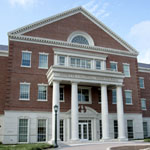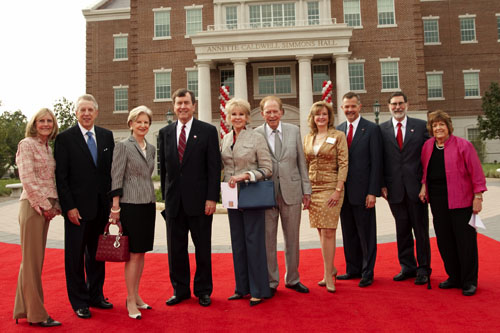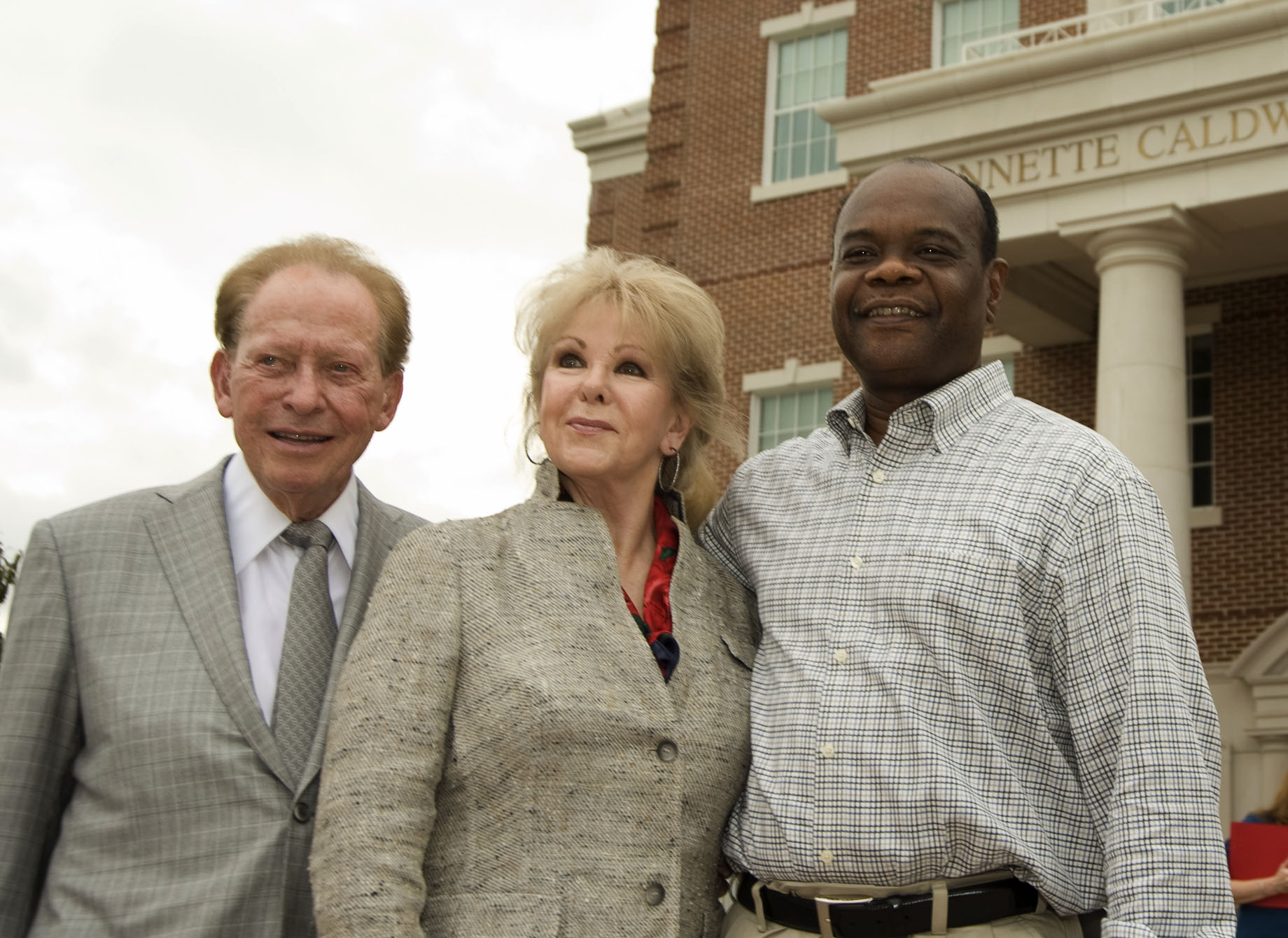Back to school at SMU's new Annette Caldwell Simmons Hall
SMU opens new facility to address critical needs in education and human development through research and teaching.

By Nancy George
SMU News
DALLAS (SMU) – Research-based solutions to compelling needs in education and human development will evolve at the new home of SMU’s Annette Caldwell Simmons School of Education and Human Development, which formally opened Friday with a dedication and ribbon-cutting ceremony.
 Participating in the September 24 dedication ceremonies for Annette Caldwell Simmons Hall were (l. to r.) Connie Blass O'Neill, co-chair of the Simmons School Campaign Committee; Richard H. Collins, co-chair of the Simmons School Campaign Committee; Caren H. Prothro, chair of SMU's Board of Trustees; R. Gerald Turner, SMU president; Annette Caldwell Simmons and Harold C. Simmons; Patricia Mathes, director of SMU's Institute for Evidence-Based Education; David Chard, dean of the Simmons School of Education and Human Development; Paul Ludden, SMU provost and vice president for Academic Affairs; and Kathy Hargrove, associate dean for Academic Affairs in the Simmons School. |
“The extraordinary vision of Harold and Annette Simmons is realized as we dedicate this wonderful new building,” said SMU President R. Gerald Turner. “The research and instruction that take place here will change lives as new findings translate into classroom innovations, advances in human development and lifetime skills.”
The light-filled 41,000-square-foot building consolidates for the first time programs that have been housed in a variety of offices across the Hilltop. Simmons Hall is the on-campus home for the Departments of Teaching and Learning, Applied Physiology and Wellness, and Education Policy and Leadership, as well as the Master of Liberal Studies program.
A pavilion for gatherings, research laboratories, the dean’s suite, classrooms, conference rooms, faculty offices and a student advising center are included in the building, located near the northeast corner of the SMU campus. Glass partitions and moveable walls surround the first-floor laboratories and pavilion, providing flexibility and showcasing education in progress.
As part of SMU’s ongoing commitment to environmentally sustainable campus buildings, Simmons Hall was built to meet Leadership in Engineering and Environmental Design (LEED) silver standards.
“The new hall is designed to provide the best surroundings for our students, faculty and staff. Already the building is giving our school a sense of community and momentum. We are completely energized,” said David Chard, the Leon Simmons Endowed Dean of the Annette Caldwell Simmons School of Education and Human Development.
Although education programs have long been part of SMU’s curriculum, the University renewed its commitment to the field in 2005 by creating the School of Education and Human Development.
A landmark $20 million gift from Harold C. and Annette Caldwell Simmons in 2007 provided an endowment for the school and the new building. The gift also created 10 Fairess Simmons Graduate Fellowships named in honor of Harold Simmons’ parents, both of whom were educators. His father, Leon Simmons, was superintendent of schools in Golden, Texas, and his mother, Fairess Simmons, was a teacher. In addition, the gift funded the Leon Simmons Endowed Deanship and Faculty Recruitment Fund.
Teachers, education advocates, Simmons faculty and staff, current students and former students have contributed more than $1.4 million to the building.
“As a former teacher, I am thrilled to see students filling the classrooms, the laboratories accommodating research and the gardens blooming with roses," said Mrs. Simmons, who has particular fondness for roses of all kinds. "My dream has come true. The education and research that takes place here will make a real difference in educating the educators and promoting human fulfillment."
Harold and Annette Caldwell Simmons have established an enduring legacy of service and generosity benefiting SMU, including endowment of four President’s Scholars and the Simmons Distinguished Professorship in Marketing in the Cox School of Business.
Mrs. Simmons earned a B.S. degree in elementary education from SMU in 1957 and later taught first, second and third grade at Maple Lawn Elementary School in Dallas and at Clark Field, a U.S. air base in the Philippines. Mrs. Simmons is a former member of the board of the SMU Tate Distinguished Lecture Series and has been active in numerous other SMU programs and civic activities.
Mr. Simmons is founder, chair and CEO of Contran Corporation, a holding company with interests in several industries. He is a former member of the executive boards of Cox School of Business and Dedman College of Humanities and Sciences. His relationship with SMU began in 1961 when he bought a small drugstore near the campus, which eventually expanded to 100 stores. He sold the chain in 1973, and it later became Eckerd Drugs.
The Simmons School offers graduate-level and specialized programs for educators and research programs that focus on how students learn and develop language skills. These programs include literacy training, bilingual education, English as a second language, gifted student education and learning therapy.
Also offered are master educator programs in science, technology, reading and mathematics. The undergraduate minor in education prepares students for teacher certification. In human development, the school offers master’s degrees in counseling, dispute resolution and liberal studies, along with wellness and noncredit lifelong learning classes. A new undergraduate major in applied physiology and sport management was created in 2009, providing students with a biological understanding of health and fitness and the business background required of sport, health and fitness professionals.
From developing the best strategies for teaching children to read to identifying math difficulties in kindergartners, faculty members at the Simmons School are dedicated to research that has a real-world impact on education locally and nationally. Ongoing research at the school’s Institute for Evidence-Based Education includes developing a reading curriculum for children with mild to moderate mental disabilities and also creating fast-track data acquisition for reading teachers to tailor instruction for individual students in grades 4-6.
In addition, researchers at the Exercise Physiology and Biomechanics Laboratory and the Locomotor Performance Laboratory analyze the complexities and mechanics of human movement. Three teaching pods are equipped with treadmills and a data acquisition system that demonstrates physiological responses to exercise, giving students a hands-on opportunity to understand physiological principles. Plans call for installation of equipment designed to analyze the mechanics of human speed and an environmental temperature chamber that will measure the effects of hot and cold temperatures on patients with diseases such as multiple sclerosis.
Dedicated to community outreach, the Simmons School shares its expertise and resources through unique programs and clinics such as the Learning Therapy Center, the Diagnostic Center for Dyslexia and Related Disorders and the Center for Child and Community Development. In addition, the Master of Science Counseling Education Program gives graduate students hands-on counseling experience and provides low-cost services to patients at the SMU Center for Family Counseling in Plano and the Resource Center of Dallas in Oak Lawn.
The outreach continues through affiliations with organizations such as the Dallas Arboretum, where the school is helping with the curriculum design for the proposed seven-acre children’s garden that will bring life science and earth science alive to kindergartners through sixth-graders. The school provides Dallas members of Teach for America with opportunities for advanced degrees and professional development, and 21 members are pursuing graduate degrees at the school. In a similar commitment to improving education in low-income neighborhoods, the school works with the West Dallas Educational Task Force in its quest to support high quality schools in the West Dallas community.
The Annette Caldwell Simmons Hall represents another success of SMU Unbridled: The Second Century Campaign, which seeks $750 million to support student scholarships, faculty and academic programs and the campus experience. The campaign had raised $452.9 million as of Aug. 31.
Related Links:
- About the Simmons School
- Partnerships with the Simmons School
- About Annette Caldwell Simmons and Harold C. Simmons
A private university in the heart of Dallas, SMU is building on the vision of its founders, who imagined a distinguished center for learning emerging from the spirit of the city. Today, nearly 11,000 students benefit from the national opportunities and international reach afforded by the quality of SMU’s seven degree-granting schools.
###
09159-nr-09/23/2010-ng
